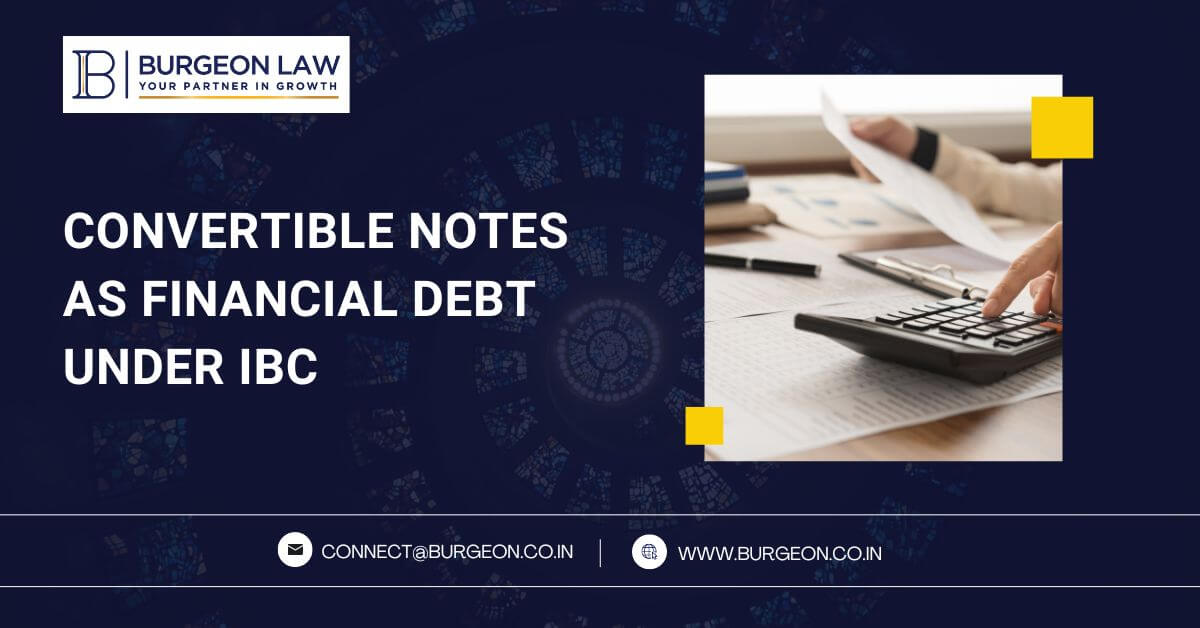Possible Treatment Of Convertible Notes As Financial Debt Under IBC
Similar to Compulsorily Convertible Debentures (“CCDs”), Convertible Notes (“CNs”) are hybrid instruments that combine elements of debt and equity. However, unlike CCDs, CNs are defined under the Companies Act, 2013. Rule 2 of the Companies (Acceptance of Deposits) Rules, 2014 (Deposit Rules), defines CNs as an instrument evidencing the receipt of money initially as debt, which is repayable at the option of the holder, or convertible into equity shares of the startup company upon the occurrence of specified events and as per the other terms and conditions of the instrument.
In stark contrast to CCDs, CNs can only be issued by startups registered with the Department for Promotion of Industry and Internal Trade (in case issued by a company which is not a registered startup, it will be classified as a deposit under Deposit Rules), and the amount that can be raised from per person is at least INR 25,00,000/- (Indian Rupees Twenty-Five Lakhs). Furthermore, CNs are required to be converted into equity shares or repaid within 10 (ten) years from the date of issue. With no such conditions attached to CCDs, investors often prefer CCDs over CNs for investing through a hybrid instrument.
Numerous judgments of NCLTs and the NCLAT have tried to clarify the treatment of CCDs as financial debt under the Insolvency and Bankruptcy Code, 2016 (“IBC”), however, the same is lacking for CNs. Such judgements (on CCDs) may provide some guidance regarding whether CNs constitute financial debt, considering the basic nature of both the instruments remains similar, i.e., they are hybrid securities that offer returns through interest and simultaneously give the right to future equity in the Company.
Various judgments, over the years, have propounded the following requirements for CCDs to qualify as financial debt:
- The CCDs should not have matured and/or converted at the time of admission of insolvency or windup of the company.
- The CCDs should have provisions for coupon/interest.
- The CCDs should be recorded as debt in the balance sheet.
- The conversion of CCDs should not be linked to events such as dissolution, insolvency, or winding up.
Furthermore, at the heart of the controversy of treatment of CCDs, and CNs as financial debt lies under the definition of “Financial Debt”. Section 5(8)(c) of the IBC defines “Financial Debt” as debt along with interest, if any, which is disbursed against consideration for the time value of money and includes any amount raised pursuant to any note purchase facility or the issue of bonds, notes, debentures, loan stock, or any similar instrument.
In this context, if the CN agreement and the terms of the issuance of CNs are drafted in such a way that aligns with the guidelines of the tribunals and considering the inherent nature of CNs, i.e., they are converted into equity shares or redeemed at the option of the holder along with interest, it does seem to fall within the definition of financial debt more than CCDs. However, since the apex court is yet to consider this, the treatment of CCDs and CNs as financial debt remains uncertain.

